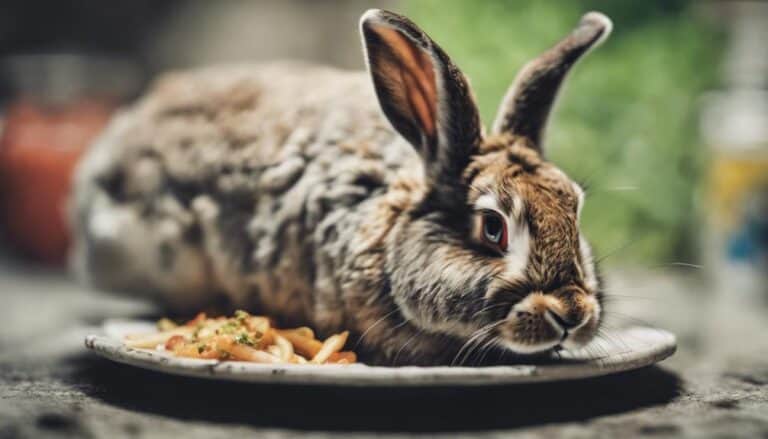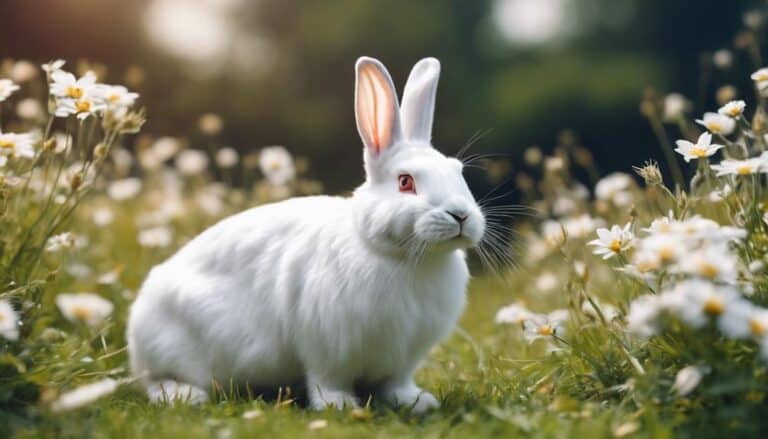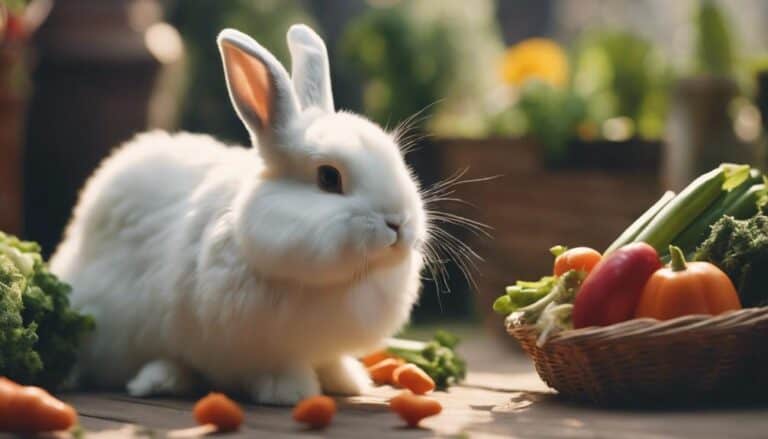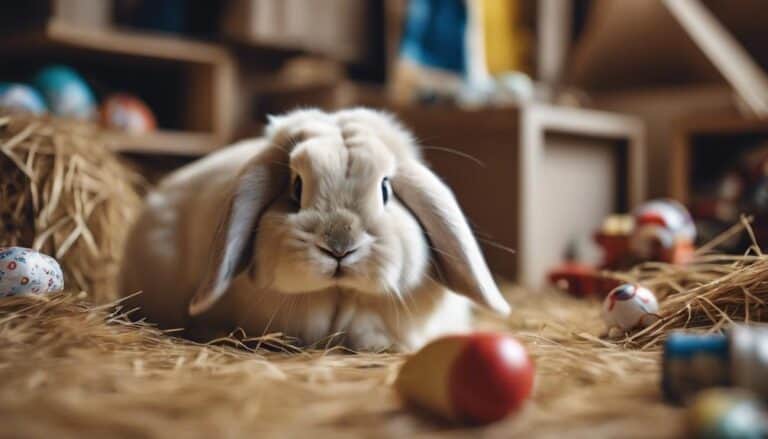If you're curious about whether bunnies can eat eggplant, it's like dipping your toes into uncharted waters. The interaction between rabbits and eggplant may surprise you.
Before hopping into conclusions, consider the nuances of this purple vegetable in a bunny's diet. Understanding the potential benefits and risks can help you make informed decisions when it comes to feeding your furry friend.
So, are you ready to uncover the secrets behind bunnies and eggplant?
Contents
- 1 Key Takeaways
- 2 Eggplant: An Overview for Bunnies
- 3 Feeding Adult Rabbits Eggplant
- 4 Eggplant for Baby Bunnies
- 5 Getting Bunnies to Eat Eggplant
- 6 Eggplant Leaves and Bunnies
- 7 Cooked Eggplant for Bunnies
- 8 Portion Control: Bunnies and Eggplant
- 9 Eggplant Varieties for Bunnies
- 10 Growing Eggplant Safely for Bunnies
- 11 Frequently Asked Questions
- 12 Conclusion
Key Takeaways
- Eggplant is safe for rabbits in moderation, providing nutrients and antioxidants.
- Introduce eggplant gradually, monitor for adverse reactions, and avoid toxic parts.
- Cook eggplant plain, offer small portions 2-3 times weekly, and watch for digestive health.
- Mix with familiar veggies, prepare creatively, and monitor for distress symptoms when feeding rabbits.
Eggplant: An Overview for Bunnies
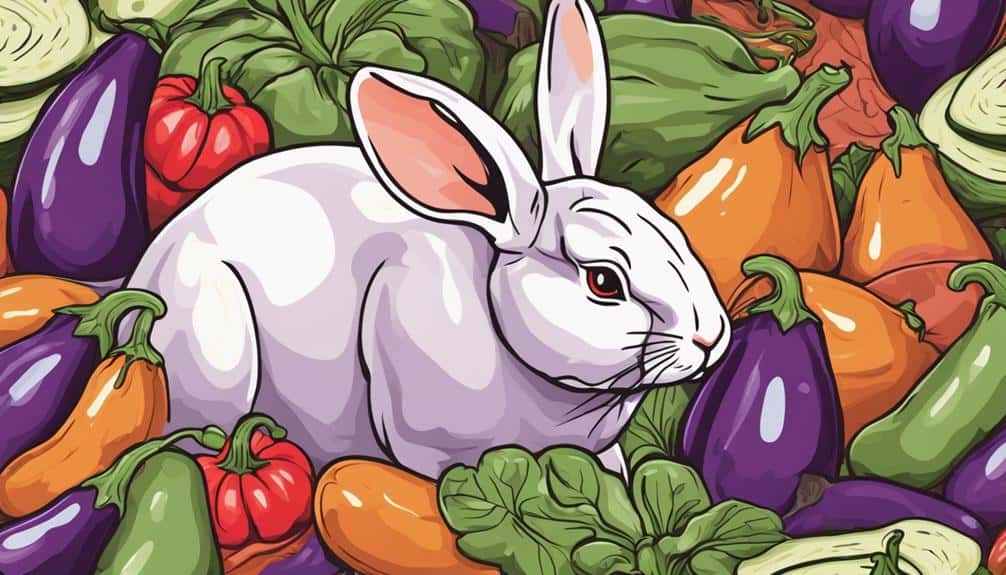
In considering eggplant as a dietary option for rabbits, it's essential to understand its botanical classification and nutritional composition. Eggplant, while botanically a fruit, is commonly considered a vegetable and belongs to the Solanaceae family. It contains low levels of sugar, fiber, phosphorus, and certain vitamins, but caution is warranted due to the presence of toxic alkaloids like solanine.
When feeding rabbits eggplant, it's advisable to start with small amounts to gauge tolerance levels and monitor for any adverse effects. Offering eggplant 2-3 times a week can be a suitable frequency. To assure top digestive health, it's important to discard the green tops and leaves of the eggplant before feeding it to your rabbit.
Feeding Adult Rabbits Eggplant
When incorporating eggplant into the diet of adult rabbits, it's important to introduce this vegetable gradually to assess tolerance levels and prevent potential health issues. Adult rabbits can consume small amounts of eggplant safely, but it should be fed in moderation, ideally 2-3 times per week. Monitor your adult rabbits closely for any adverse reactions or digestive problems after feeding them eggplant. It's vital to avoid feeding rabbits the leaves, stems, flowers, or seeds of eggplants as these parts can be harmful to them. Introduce eggplant slowly into the diet of your adult rabbits, watching for any signs of intolerance or gastrointestinal issues. Below is a table summarizing key points for feeding adult rabbits eggplant:
| Key Points | Details |
|---|---|
| Feeding Frequency | 2-3 times per week |
| Parts to Avoid | Leaves, stems, flowers, seeds |
| Monitoring | Watch for adverse reactions or digestive problems |
| Introducing Eggplant | Gradually incorporate into the diet to assess tolerance levels and prevent health issues |
Eggplant for Baby Bunnies
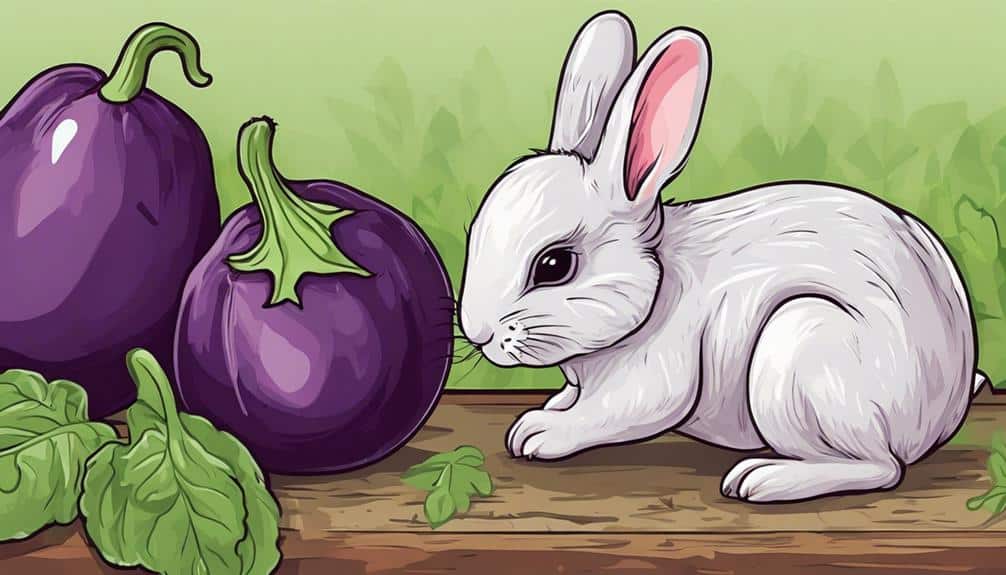
Introducing eggplant gradually and cautiously to baby bunnies can help assess their tolerance levels and potential benefits from this vegetable. Baby rabbits eat delicate digestive systems, and those under 12 weeks old should avoid eating eggplant due to this sensitivity.
If you decide to offer eggplant to young rabbits, it's important to start with very small portions to test their reaction. While some young rabbits may benefit from the nutrients in eggplant when offered in tiny amounts, it's essential to monitor them closely for any signs of digestive issues.
To guarantee their well-being, avoid feeding baby bunnies eggplant skins, leaves, or seeds as these parts can be harder to digest. By feeding eggplant cautiously and monitoring their response, you can help determine if this vegetable is suitable for your baby bunnies without risking their digestive health.
Getting Bunnies to Eat Eggplant
To encourage bunnies to eat eggplant, mix small pieces of this vegetable with familiar veggies they enjoy. Lightly steam or roast the eggplant to enhance its aroma and make it more appealing to your rabbits. Remember to offer small chunks of eggplant alongside their favorite treats to introduce it gradually. You can also rub a piece of eggplant on your bunnies' lips to familiarize them with the scent before feeding it to them. Being patient and creative in how you introduce eggplant to your bunnies can increase their acceptance of this new food.
| Rabbit | Eggplant | Favorite |
|---|---|---|
| Small | Cooked | Familiar |
| Introduce | Bunnies | Veggies |
| Gradually | Aroma | Acceptance |
Eggplant Leaves and Bunnies
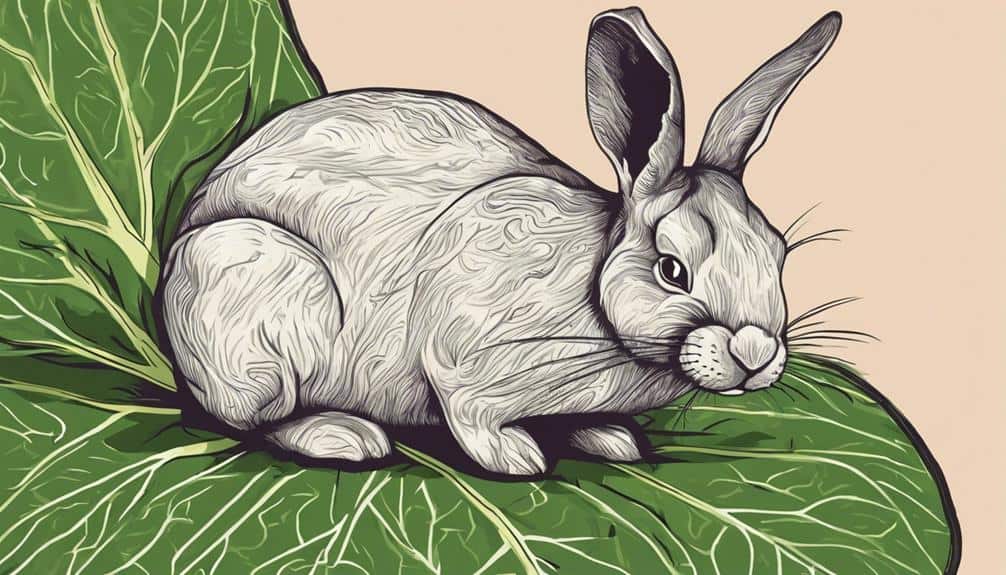
When considering eggplant leaves and bunnies, it's important to prioritize bunny safety.
Remember that eggplant leaves contain higher levels of solanine, which can be toxic to rabbits.
Taking precautions by feeding only the flesh of the eggplant can help prevent any potential health risks for your furry friends.
Bunny Safety With Eggplant Leaves
Bunnies should steer clear of eggplant leaves due to their high solanine content, which poses a risk of toxicity to these furry creatures. It's important to understand that eggplant leaves can be harmful to your rabbits' digestive system, potentially leading to solanine poisoning. To guarantee your bunny's safety, avoid feeding them eggplant leaves and limit their consumption to the flesh of the vegetable in small quantities. Keep a close eye on your rabbits for any symptoms of distress or illness if they accidentally come into contact with eggplant leaves. Here is a table summarizing the key points for bunny safety with eggplant leaves:
| Bunny Safety with Eggplant Leaves |
|---|
| Eggplant leaves contain solanine, a toxic compound harmful to bunnies. |
| Ingesting eggplant leaves can lead to solanine poisoning in rabbits. |
| Avoid feeding bunnies eggplant leaves to prevent health risks. |
| Monitor rabbits for any signs of distress if they come in contact with eggplant leaves. |
| Only feed your bunny the flesh of eggplant in small amounts for safety. |
Nutritional Benefits for Bunnies
For best nutrition, consider the benefits of incorporating eggplant flesh into your bunny's diet.
Eggplant leaves are part of the Solanaceae family, containing solanine, a toxic compound harmful to bunnies.
Here are some key points to keep in mind:
- Favor the Flesh: The flesh of eggplant is safe for bunnies to consume and provides essential nutrients.
- Avoid the Leaves: Eggplant leaves have higher levels of solanine than the fruit, making them unsafe and potentially toxic for your bunny.
- Safeguard Their Health: By only offering the flesh of the eggplant to your bunny, you can prevent any risks of solanine poisoning and ensure their well-being.
Precautions for Bunny Owners
To guarantee the well-being of your bunny, abstain from providing any eggplant leaves as they contain higher levels of solanine, posing a risk of toxicity to your pet. Eggplant leaves belong to the nightshade family Solanaceae, which can be harmful to rabbits if consumed in significant amounts.
The solanine in these leaves interferes with the metabolism of amino acids in your bunny, potentially leading to health issues. It's crucial to make smart choices when deciding which foods to feed your pet to safeguard their well-being.
Opt for feeding eggplant fruit in low levels as a treat instead of including the leaves, safeguarding your rabbit's health. Remember, a balanced and varied diet is key to maintaining your bunny's health and happiness.
Cooked Eggplant for Bunnies
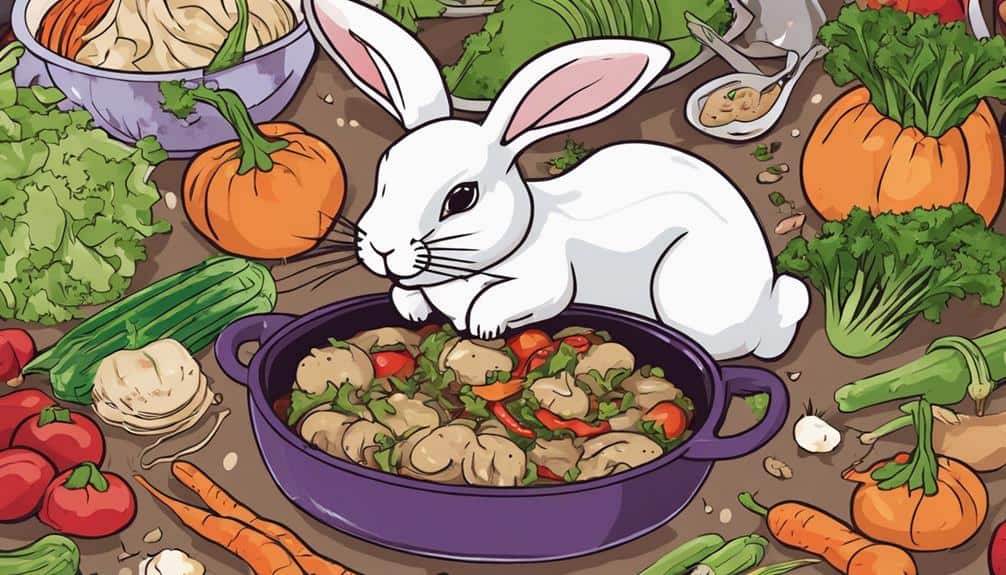
When considering cooked eggplant for your bunny, it's important to understand that cooking can diminish its nutritional benefits. Bunnies are sensitive to fats, spices, and herbs often present in cooked eggplant dishes, which can upset their digestive systems.
Additionally, different cooking methods have little effect on reducing the potentially harmful solanine content in eggplant.
Nutritional Benefits of Eggplant
Cooked eggplant offers rabbits a rich array of essential nutrients, including manganese, vitamins, and minerals important for their well-being. When incorporating cooked eggplant into your rabbit's diet, they benefit from:
- Vitamins: Eggplant provides vitamins C, B5, B6, E, K, and folate, essential for overall health.
- Minerals: Rich in minerals like calcium, iron, phosphorus, and potassium, supporting various bodily functions.
- Antioxidants: Cooking eggplant for bunnies introduces antioxidants such as quercetin, kaempferol, and anthocyanins, aiding in combating oxidative stress.
Proper Preparation Methods
After learning about the nutritional benefits of eggplant for rabbits, ensuring proper preparation methods for cooked eggplant is essential for your bunny's health and well-being. Cooking eggplant for your pet rabbits can reduce the risk of ingesting harmful compounds present in raw eggplant.
It's important to cook the eggplant without any oils, spices, or herbs, as these ingredients can be toxic to their delicate digestive systems. While cooking methods may not greatly reduce the solanine content in eggplant, moderation in feeding cooked eggplant is key to preventing issues like obesity and heart disease in your furry family members.
Portion Control: Bunnies and Eggplant
For essential health and safety, it's vital to carefully regulate the amount of eggplant offered to bunnies in their diet. When it comes to portion control for bunnies and eggplant, keep these points in mind:
- Limited Quantities: Adult rabbits can safely consume small amounts of eggplant, such as 1-2 small slices or chunks (approximately 1-2 tablespoons) 2-3 times per week at most.
- Avoid Excessive Intake: It's essential to avoid feeding eggplant daily or in large quantities to prevent the intake of high levels of oxalates, which can be harmful to rabbits.
- Monitor Health: Monitoring your rabbit's health and stool consistency when introducing eggplant is vital to ensure they tolerate it well.
Eggplant Varieties for Bunnies
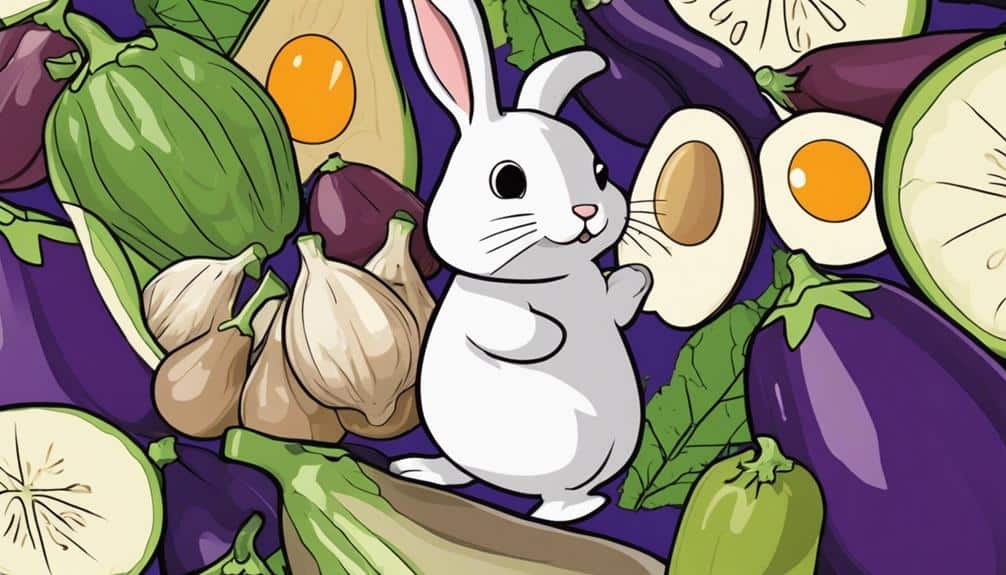
When considering the suitability of eggplant varieties for your bunny's diet, it's important to acknowledge that various types such as Globe, Italian, Japanese, Chinese, and Thai offer similar benefits and risks. These eggplant varieties can be a healthy addition to your bunny's diet when given in controlled amounts.
While visually different, all these types of eggplants are safe for bunnies to eat in moderation. The fruit of these varieties provides essential nutrients and can be a tasty treat for your furry friend. However, it's important to remember that too much of any of these eggplant varieties can lead to digestive issues in bunnies.
Growing Eggplant Safely for Bunnies
To safeguard the safety of your bunnies when cultivating eggplant, it's crucial to take measures to protect the plants from rabbit damage. Here are essential steps to make sure your bunnies can enjoy eggplant safely:
- Protective Measures: Shield your eggplant plants from rabbits by using raised beds, fencing, or movable pens to prevent direct access to the vegetation.
- Avoid Toxic Parts: Refrain from feeding your rabbits eggplant leaves and stems, as these parts can be harmful to their health. Only provide them with the safe portions of the eggplant.
- Close Monitoring: Keep a watchful eye on your rabbits to make sure they aren't consuming any toxic parts of the eggplant. If you notice any suspicious behavior, act promptly to prevent any harm.
Frequently Asked Questions
Do Rabbits Eat Eggplant in the Garden?
In the garden, rabbits might eat eggplant, but be cautious. Eggplant toxicity can harm bunnies. Protect plants to make sure pet health. Choose safe vegetable options to keep your garden and pets thriving.
Can Animals Eat Raw Eggplant?
When considering animal diets, be mindful of eggplant toxicity. Cooking eggplant can reduce risks, ensuring safe digestion for pets. Raw food dangers exist, so introduce new veggies like eggplant gradually. Monitor pet health closely for any adverse reactions.
What Vegetables Can Rabbits Not Eat?
You should be aware of toxic vegetables, harmful foods, and forbidden veggies in a rabbit's diet. Avoid feeding rabbits avocado, onions, garlic, and iceberg lettuce. Limit high-sugar vegetables like carrots and fruits to prevent health issues.
Why Can't Rabbits Eat Bananas?
Your rabbits shouldn't consume bananas due to their high sugar content, which can disrupt their sensitive digestive systems. Meeting their nutritional needs with a balanced diet rich in fiber and limited fruit treats is crucial.
Conclusion
To sum up, bunnies can enjoy eggplant in moderation as part of a balanced diet. Remember to monitor for any adverse reactions and avoid feeding them the leaves and green tops of the eggplant.
By practicing portion control and introducing new foods gradually, you can guarantee your bunny's safety and health. Choose eggplant varieties carefully and grow them safely for your furry friends to enjoy.
Remember, balance is key for bunnies and their eggplant treats!

